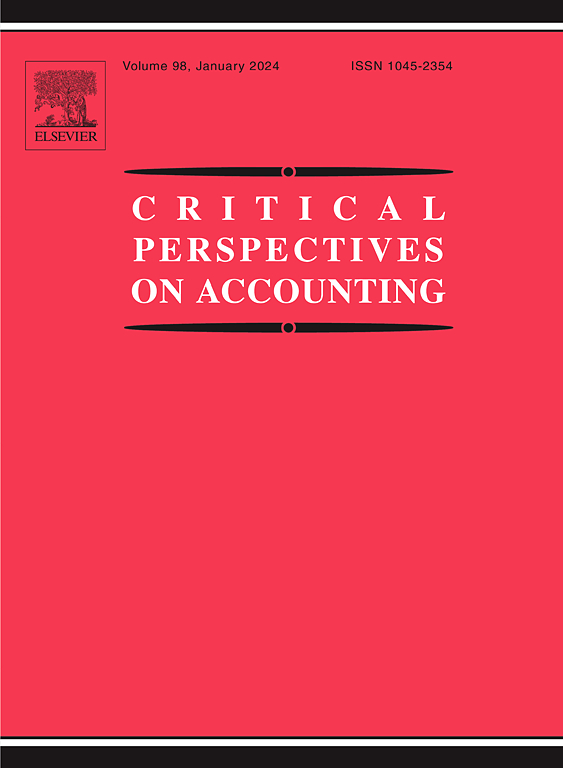Therapeutic governance: The art of mediating shame and blame and quasi-judicial pragmatic technologies in Indonesian government auditor-auditee engagements
IF 8.3
2区 管理学
Q1 BUSINESS, FINANCE
引用次数: 0
Abstract
Government audit services provided by state auditors are frequently beset by complex and often emotional engagements with the auditees. Both auditors and auditees are subjected to multiple yet conflicting socio-political rationalities, administrative demands, and complex performance measurements. Auditees often perceive these interactions as a source of burden, fear, frustration, anxiety, and, at times, resistance or even revulsion regarding the audit process. Our ethnographic case study shows that the Indonesian government auditors and auditees employ the arts of the emotional self, as they feel burdened with the potential shame and blame that might result from an unsuccessful audit. Our study provides insights into how the quasi-judicial rationalities and bureaucratic demands manifested in various indices of performance imposed upon auditors and auditees lead to the critical need to achieve unqualified audit opinions. The pressures of ensuring a successful audit and reputation maintenance stimulate the enfolding of emotionalities in different stages of the audit process. Our study reveals auditor-auditee engagement in therapeutic governance as a mediation strategy to avoid the enfolding of shame or blame around a failure to achieve the targeted audit performance. In such a complex audit setting, both parties engage in pragmatic technological actions by administering shifts in roles and fostering familiarity to co-produce audit evidence.
治疗性治理:在印度尼西亚政府审计师与被审计者的合作中,调解羞愧和指责的艺术以及准司法实用技术
国家审计机关提供的政府审计服务经常受到与被审计单位之间复杂且往往是情绪化的接触的困扰。审计人员和被审计单位都要面对多种相互冲突的社会政治理由、行政要求和复杂的绩效衡量标准。被审计者往往认为这些互动是负担、恐惧、沮丧、焦虑的来源,有时甚至是对审计过程的抵触甚至反感。我们的人种学案例研究表明,印尼政府审计人员和被审计人员都运用了情感自我艺术,因为他们对不成功的审计可能导致的耻辱和指责感到负担沉重。我们的研究深入揭示了强加给审计师和被审计者的各种绩效指标所体现的准司法理性和官僚要求是如何导致对获得无保留审计意见的迫切需求的。确保审计成功和维护声誉的压力激发了审计过程不同阶段的情感。我们的研究揭示了审计师与被审计方参与治疗性治理是一种调解策略,可避免因未能实现目标审计绩效而产生羞愧或自责情绪。在这样一个复杂的审计环境中,双方都参与到务实的技术行动中,进行角色转换,增进熟悉度,以共同提供审计证据。
本文章由计算机程序翻译,如有差异,请以英文原文为准。
求助全文
约1分钟内获得全文
求助全文
来源期刊

Critical Perspectives on Accounting
BUSINESS, FINANCE-
CiteScore
9.40
自引率
7.80%
发文量
91
期刊介绍:
Critical Perspectives on Accounting aims to provide a forum for the growing number of accounting researchers and practitioners who realize that conventional theory and practice is ill-suited to the challenges of the modern environment, and that accounting practices and corporate behavior are inextricably connected with many allocative, distributive, social, and ecological problems of our era. From such concerns, a new literature is emerging that seeks to reformulate corporate, social, and political activity, and the theoretical and practical means by which we apprehend and affect that activity. Research Areas Include: • Studies involving the political economy of accounting, critical accounting, radical accounting, and accounting''s implication in the exercise of power • Financial accounting''s role in the processes of international capital formation, including its impact on stock market stability and international banking activities • Management accounting''s role in organizing the labor process • The relationship between accounting and the state in various social formations • Studies of accounting''s historical role, as a means of "remembering" the subject''s social and conflictual character • The role of accounting in establishing "real" democracy at work and other domains of life • Accounting''s adjudicative function in international exchanges, such as that of the Third World debt • Antagonisms between the social and private character of accounting, such as conflicts of interest in the audit process • The identification of new constituencies for radical and critical accounting information • Accounting''s involvement in gender and class conflicts in the workplace • The interplay between accounting, social conflict, industrialization, bureaucracy, and technocracy • Reappraisals of the role of accounting as a science and technology • Critical reviews of "useful" scientific knowledge about organizations
 求助内容:
求助内容: 应助结果提醒方式:
应助结果提醒方式:


